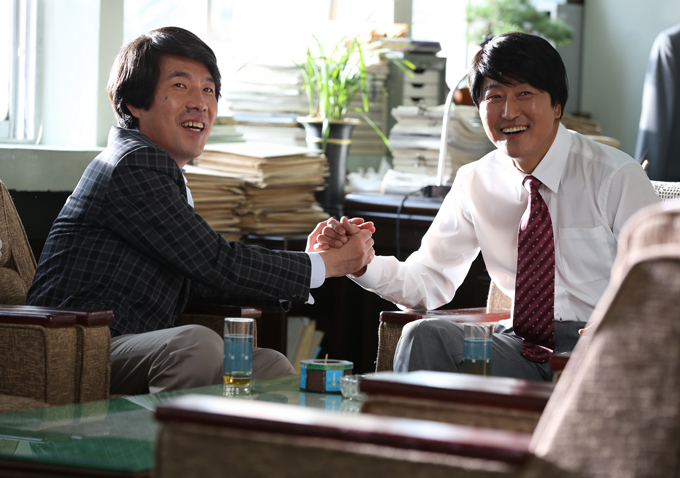
Initially, “The Attorney” positions itself as an unlikely Horatio Alger-type story. Kicking off in 1978 and continuing through the ’80s, in Busan, South Korea, the film follows Song Woo-seok (Sang Kang-Ho) is a luckless lawyer with only a high school education, barely making enough to get by. He’s married with two kids, the home they live in has rats in the walls, and his shabby office is hardly a welcoming environment for clients. But inspiration strikes when Song discovers a loophole that lets him legally participate in some kind of real estate registration (it’s never quite clear what exactly it is) that was normally reserved solely for notaries. It’s a booming market, with tons of cash to be made by doing little more than paperwork, and without stepping into a courtroom, and Song finds his calling. He hustles his new practice by handing out business cards, and while he soon becomes a success, he remains a laughingstock among his peers. But Song could hardly care, as he’s moving on up, bringing home literal bags of cash; so much that his wife doesn’t know what to spend it on.
And for about the first hour of “The Attorney,” the film is a mostly lighthearted story of a man pulling himself up by his bootstraps, surviving dire poverty, studying hard, and building a successful career and personal life. Kang-Ho’s portrayal of the character is winning, with the actor making Song something of a schemer, and a bit shallow too, as his eyes are continually on the next dollar. But he’s also well-meaning and sweet, paying back his debts and never forgetting those who helped him on the way up. And that includes Soon-ae (Kim Young-ae), the proprietor of a small restaurant off of a lonely alley, who kept Song fed during his days when his nose was in books and he could barely put together a few dollars. He remains loyal to Soon-ae, patronizing her modest business every day, even as his personal fortunes eventually see him buying a boat. But the day Soon-ae needs a favor returned is when his world comes crashing down.

Due credit to director Yang Woo-soek, as he transitions rather seamlessly from the rather breezy, bouncy and often comedic first half of his film, into what becomes a deadly serious legal procedural in the second half. But it’s just a shame the film becomes so much less interesting as it goes on. When Song-ae’s innocent teenage son Jin-woo (Lim Si-Wan) goes missing one evening—rounded up with great efficiency by the military police on the hunt for communists, and held in secret—she closes the restaurant to look for him. Over a month later, she eventually learns where he’s being kept behind bars, and implores Song for his help. The timing couldn’t be worse and he’s initially reluctant, as he’s on the precipice of landing a client that could take his business to a national stage. But when he does look at the matter more closely, it shakes him to the core.
For a man who firmly believed in the system, and that if anyone applied themselves seriously they would get a fair shot at a happy life, what Song learns is disturbing. It makes him question his own values and the fairness that he previously and perhaps naively was convinced made for a level playing field. It’s great character stuff, but unfortunately, “The Attorney” doesn’t dwell too long on such matters. Instead, it turns into an increasingly strident courtroom drama. You don’t really need to know the history of South Korea to understand what Song learns, as it will be quite familiar to Americans. Essentially, the government created a separate rule of law for dealing with those they deemed seditious, allowing officials to arrest individuals without a warrant, hold them for fifty days and as we soon find out, and torture them to extract (forced) confessions to justify their actions. And Song doesn’t like it.

What could serve as a fascinating parallel between recent history and contemporary questions about the value of extraordinary rules of engagement in a time of omnipresent threats of terror, instead turns into a mawkish, inspirational lawyer movie, about a former cash-grab attorney now fighting for justice and the constitution. Song, who gained a reputation for never having to step in front of a judge, transforms rather miraculously into a great (and angry) orator, with each part of the trial another opportunity for speech-making leading to another shocking revelation. Yang Woo-soek unfortunately gets stuck on this format, tossing in every cliché of the legal drama genre he thinks of; threats, ejections from the court and more, almost like a checklist. Flirtations with other plot threads, including one involving a cynical journalist who keeps his provocative stories under wraps in order to keep his job, don’t get the attention they deserve. Not to mention that Song’s family—perhaps the best window on the changes he undergoes—are largely absent from the second half of the movie.
By time “The Attorney” gets to its rousing finish followed by tragic anti-climax, the movie has buckled under it’s own idealism, weakened by the conventional tropes that Yang Woo-seok keeps piling on to this picture. The narrative may hit all the markers, but its transparent attempts to wring emotion fail to move. More frustrating is that on the edges is a far more fascinating tale, with the director continually swerving past much more compelling avenues, including the idea of patriotism rationalizing abhorrent, unpatriotic behaviour. Perhaps lacking the confidence or interest in going down these paths, it’s not a surprise that as the director shifts focus from being entertaining with something to say underneath, to focusing directly on its message, it quickly begins to wear out its welcome. As well-meaning as it may be, “The Attorney” doesn’t do justice to the characters or performances (which are, across the board, better than the final film deserves) it presents. [C]

